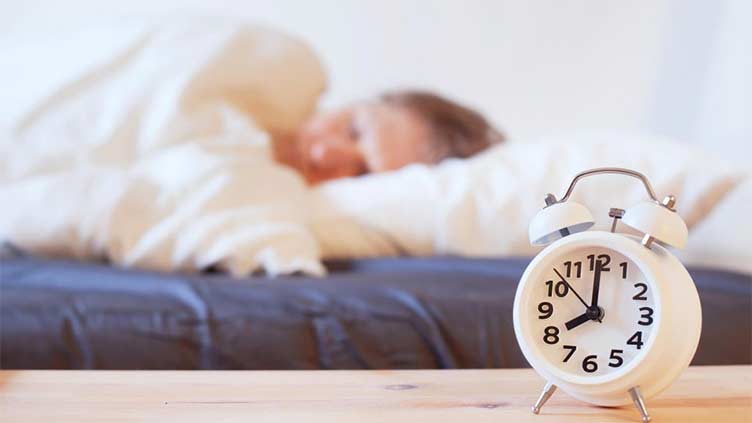Sleep quality more important for quality of life than sleep duration, study finds

They based their analysis on the parameters of well-being.
ISLAMABAD, (Online) - Czechian scientists say that sleep quality plays a greater role in influencing the quality of life (QoL) than sleep duration or timing.
Their study, published in the open-access journal PLOS ONE, is among the first to observe the impact of changes in sleep quality over the long term.
It is also the first study to test how social jetlag, a mismatch of internal sleep rhythms and environmental demands, may affect QoL.
Lead authors Michaela Kudrnácová of Charles University’s Faculty of Social Sciences and Aleš Kudrnác, Ph.D., of the Institute of Sociology, Czech Academy of Sciences concluded:
“While when we sleep and how long we sleep is important, individuals who have better quality sleep also have a better quality of life, regardless of the time and length of sleep. In addition, by following [4,523] people for three years, we found that those whose sleep improved also had an improved quality of life.”
Previous studies have shown that sleep disruptions and low quality sleep may decrease the quality of life.
Defining quality of life
The Charles University researchers define the quality of life (QoL) as “an interplay between the perception of an internal state, such as the experience of happiness or feeling of good heath or satisfaction, and external events in the surrounding environment, which may include family and career.”
They based their analysis on the parameters of well-being, satisfaction with life, happiness, and meaning in life.
What is social jetlag?
Social jetlag is a term that describes the difference between biological time, determined by internal circadian rhythms, and social times, primarily determined by the external environment. The increasing use of artificial light and nightwork is largely responsible for this pervasive “circadian misalignment”.
Considering that the circadian clock regulates a host of physiological processes, health experts have linked social jetlag with negative health outcomes. These include poor sleep, hypertension, impaired cognitive performance, mental health conditions, and metabolic disorders.
Data on sleep quality, duration, bedtime
The Charles University team consulted data from the Czech Household Panel Study (CHPS), focusing on information collected over three years.
The survey interviewed all members of the sampled households. In each “wave” of data collection, the same members of the same households were asked to contribute.
Czech adults submitted a total of 5,132 self-administered questionnaires about sleep patterns, health, and work in 2018. Responses totaled 2,046 in 2019 and 2,161 questionnaires in 2020.
The drop in the sample between 2018 and 2019 was due to a blood draw requirement.
The experts studied the effect of sleep on the dependent QoL variables described earlier.
For instance, they measured life satisfaction according to responses to the question “All things considered, how satisfied are you with your life as a whole?” They gauged perceived happiness with responses to the question “Taking all things together, how happy would you say you are?”
Additionally, the study measured sleep duration, perceived sleep quality, and social jetlag.
Sleep duration was calculated according to the reported responses regarding sleep and wake times on workdays and free days. Perceived quality of sleep was based on answers to the question “How would you rate the quality of your sleep?”
The researchers calculated social jetlag “as the difference between the mid-sleep time on free days and workdays.”
Individual and household sleep patterns
To evaluate their hypotheses on the effects of sleep aspects on QoL, the Charles University team repeatedly measured the CHPS data within both individuals and households.
They found that social jetlag and sleep duration were important in explaining differences in quality of life between different people. Social jetlag was linked to lower life satisfaction and higher work stress, whilst longer sleep duration was associated with lower levels of happiness and worse subjective health.
However, higher sleep quality was the most important variable as it was associated with better outcomes across all the indicators of quality of life: greater life satisfaction, more well-being, higher happiness, better subjective health, and less work stress.
When they looked at changes within individuals during the study duration, rather than comparing different people, again sleep quality was the most important variable. Changes in a person’s sleep duration or social jetlag did not affect their QoL measures. Contrastingly, improvements in the quality of sleep were associated with increased life satisfaction, well-being, happiness, and subjective health.
This is in agreement with previous research that suggests sleep quality is a strong predictor of QoL.
Study strengths and limitations
Medical News Today discussed this study with David Cutler, MD, a family medicine physician at Providence Saint John’s Health Center in Santa Monica, CA. He was not involved in this work.
Dr. Cutler told MNT that the findings were important, but their shortcomings made him hesitant to draw definitive conclusions:
“Since all data was collected from one country, you may not be able to generalize the conclusions to all countries. And data were collected during the longer summer months, so the results may not apply to the entire year. Results were self-reported, so subject to reporting bias.
And since not all questionnaires were returned, selection bias may also apply.”

